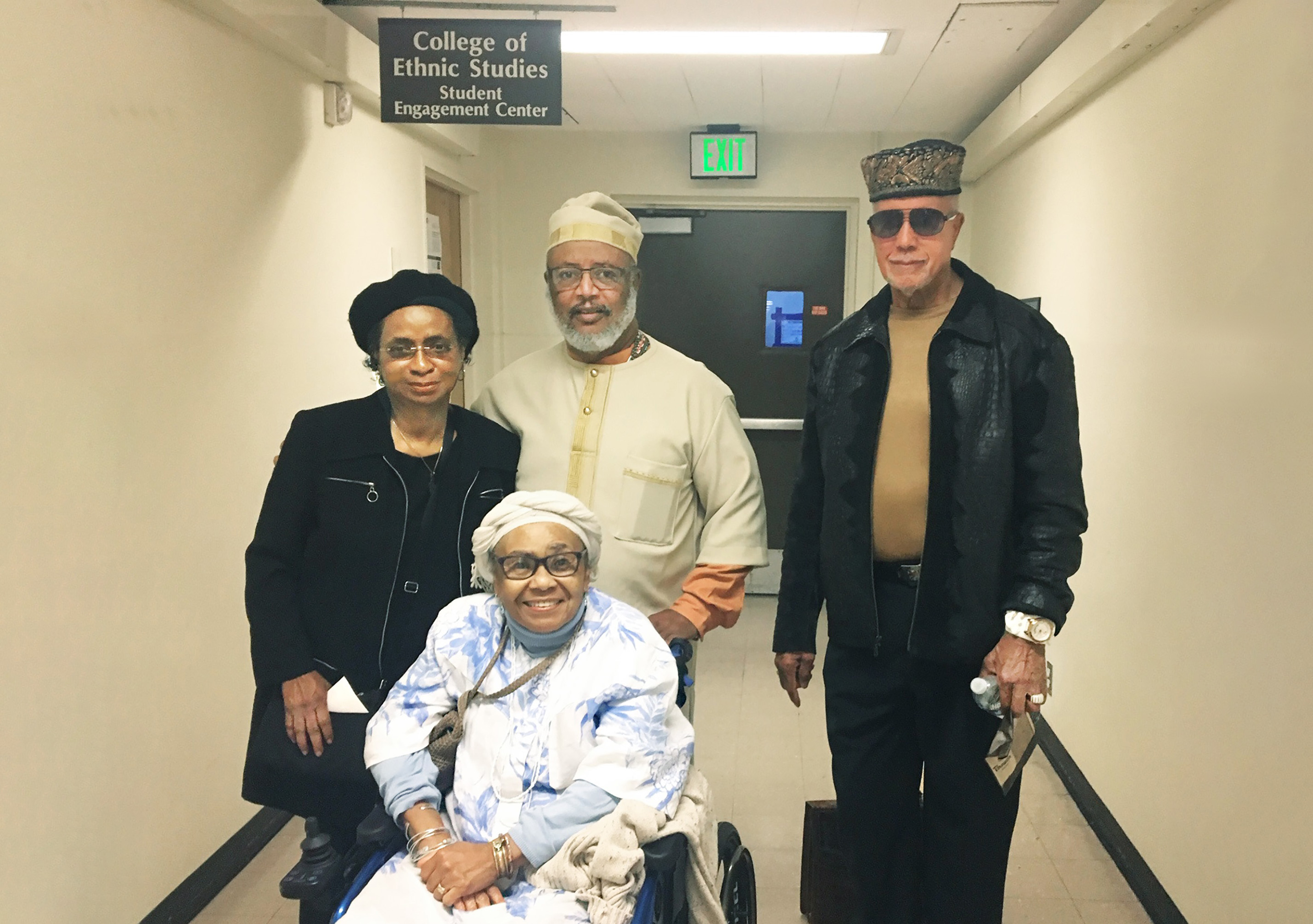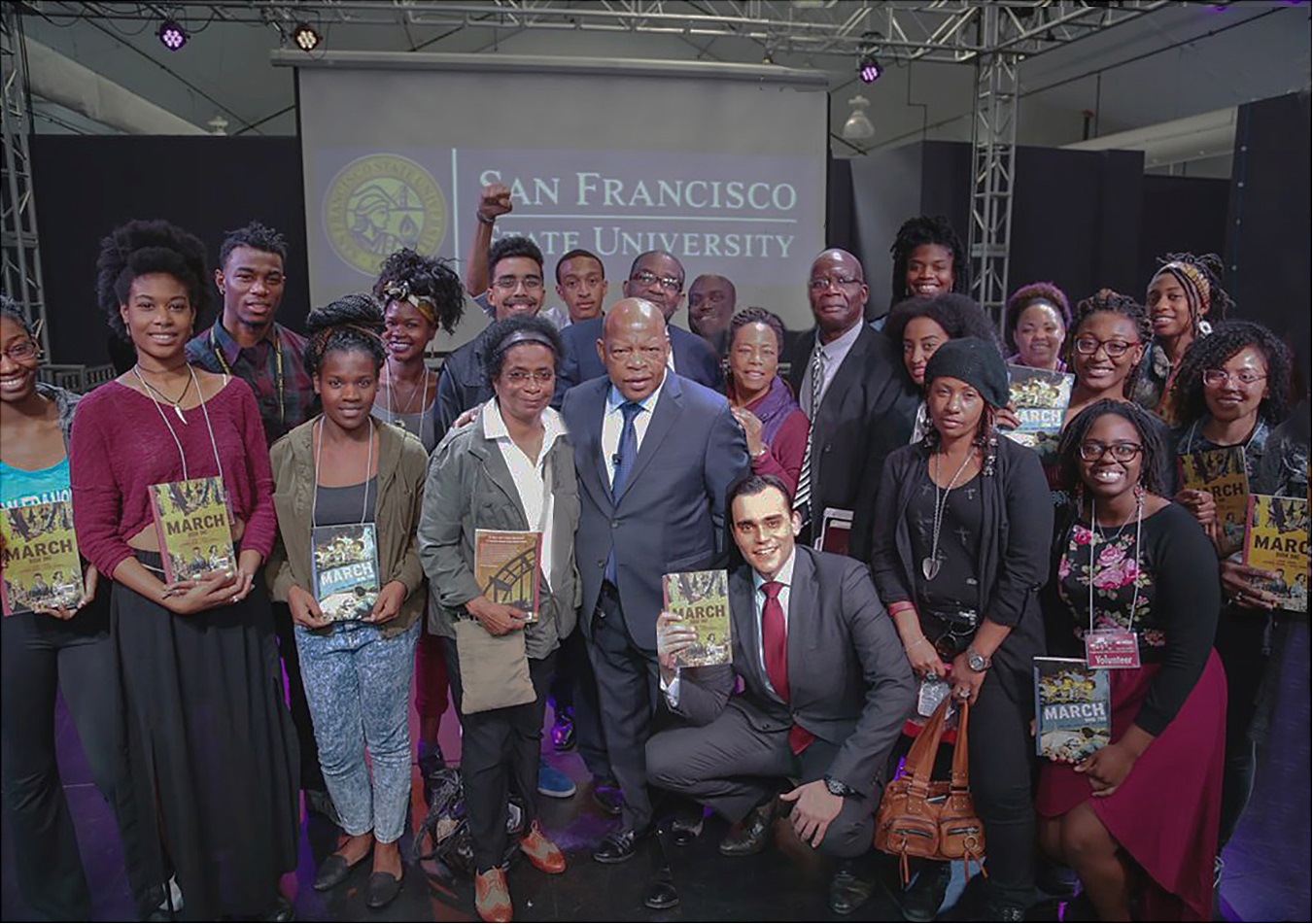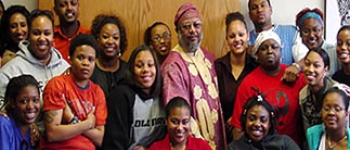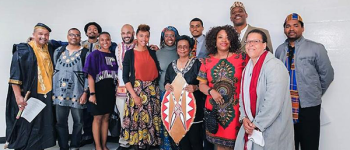Welcome to Africana Studies
The Africana Studies Department at San Francisco State University provides students with the experiences of challenging traditional thoughts and practices, and also gives them an opportunity to explore new and alternative paradigms and theories. It not only prepares students to understand the world in which they live, but to see where the world is wanting and to have the ability and the desire to make it better.
In studying Africana Studies, students are able to learn about critique, and be inspired by the accomplishments of Africans and African Americans who shaped and are shaping the moral conscience, artistic genius, scientific and technical achievements, and political activism of their time.
Explore Africana Studies
Contact
1600 Holloway Avenue
Ethnic Studies/Psychology Building Room 103
San Francisco, CA 94132
Department Email: afrs@sfsu.edu
Department Phone: (415) 338-2352
The interdisciplinary field of Blacks Studies — alternatively called African American Studies, Afro-American Studies, Africana Studies, Pan African Studies, or Black World Studies, depending on the school where it is offered — is a relative newcomer on the academic scene and its proponents have had to defend its theoretical underpinnings and practicality, something which the traditional liberal arts fields are also challenged to do but not to the same extent. Since the establishment of the nation’s first Black Studies department in 1968 at San Francisco State University, and despite the wide acceptance and institutionalization of Black Studies in academia, there still remains the nagging question about its ability to produce outstanding citizens equal in quality to individuals who as undergraduates majored in, say, history or English or art. Black Studies has now been around long enough to notice its handiwork: men and women constructively contributing to society, employed in a wide variety of professions.
It is a difficult task to compile a list of noteworthy people who majored in Black Studies because there are so many who could easily qualify. This list merely scratches the surface. Black Studies attracts a broad spectrum of interested scholars. Not only persons of African descent, but also persons of European, Asian, Latino, Middle Eastern, and Native American descent are represented in the list. Some of those mentioned are virtually household names or have received considerable local or regional attention. It is interesting to note which schools have produced large numbers of high achievers on the list, and rather surprising to learn that many medical professionals first earned degrees in Black Studies. Professions range from A (Astronaut) to Z (Zoo administrator). In short, the answer to those asking what can a person do with a Black Studies major is simple: . . . Anything!
Most of the entries contain a one-sentence summary of the person’s occupation, the type of degree obtained in Black Studies, and additional (usually graduate) degrees in other disciplines which the person was granted.
— Robert Fikes, Jr., Librarian
San Diego State University
The Passing of Dr. Nathan Hare, “A Great One”
By Dr. Oba T’ Shaka, Professor Emeritus and former Chair of Africana Studies, San Francisco State University
On June 10, 2024, Dr. Nathan Hare joined the ancestors. The founders of the greatest civilization in the history of humanity the civilization of Kemet, (known to the world as Egypt), were a people called the Anu. They defined themselves by three vertical registers that meant, “Great Ones!”
Who was Dr. Nathan Hare? He was a Great One! He was a fearless Black man who bravely fought the enemies of Black freedom, and Blacktruth with his fist, his mind, his writings, his teachings and through taking political action. Just as the Anu founded the greatest classical civilization in antiquity, so Dr. Nathan Hare as a representative of the best in African American culture, founded the discipline of Black Studies in the most alien of spaces the white college at San Francisco State College where Black students barely existed, and Black faculty and Black curriculum were non-existent. Dr. Hare became the first coordinator of Black Studies in the United States and a participant in the successful strike for Black and Ethnic Studies that gave birth to the first Black Studies Department and College of Ethnic Studies in the United States.
As the leader of the only successful Black Freedom and Black Power Movement in the north in the sixties to today, The San Francisco Black Freedom and Black Power Movement and Chair of The Afro-American Institute, now PAPO (Pan African People’s Organization) it was my honor every day to walk the picket line of the SFSU Strike for Black Studies. There, Nathan and I became friends. After the strike, Nathan would come by PAPO’s headquarters, The Malcolm X Unity House and we exchanged ideas on the state of the Black Liberation Movement and the work we were doing in the movement.
What impressed me most about Nathan was the originality of his mind. His thinking wasn’t restricted to any ideology. When he co-founded the Black Scholar Journal, he encouraged it to be a journal of thought that allowed a wide range of Black scholarship that caused Blacks to think. When the Journal became captured by a dogmatic leftist line, Nathan had to leave. He wasn’t going to be a slave to anyone’s thoughts.
In 1984, Nathan Hare authored a very important book entitled, The Endangered Black Family. Dr. Hare had a Ph.D. in sociology from the University of Chicago, and he later acquired a second Ph.D. in psychology. This book on the Black family was a seminal work. He was the first scholar to observe that between 1968 and 1984 the Black family had undergone more erosion than between 1619 and 1984. He noted that for over one hundred years 75% of Black families had maintained a remarkable unity consisting of two-parent households. By 1984, this number had fallen to 50% two-parent households. Today, only 29% of Blacks live in two parent households. A significant part of my writings and the writings of my other scholars on the Black family have addressed this issue first raised by Dr. Nathan Hare.
In 1984, I became Chair of the Black Studies Department at San Francisco State University where I had been teaching since 1972. Dr. Hare was fired by Dr. Hayakawa at the end of the SFSU strike. Subsequently, he was white balled from teaching in the U.S. university system. The first person I hired was Dr. Nathan Hare, The Father of Black Studies. The students and faculty of Black Studies were happy to have the master home. I then got the Black Studies tenured faculty to agree to support Dr. Hare for the tenure tract position in sociology. Dr. Lawford Goddard a sociologist and lecturer in Black Studies agreed to step aside as a candidate for this position in favor of Dr. Hare. My strategy for getting Dr. Hare approved for this position depended upon surprise and had a good chance of Nathan being recommended by the acting Provost Dr. Eric Solomon who had been a supporter of the strike for Black Studies. As Acting Provost, he wasn’t concerned about pleasing the President of SFSU Robert Corrigan. Unfortunately, the university was tipped off about this recommendation, destroying the chance for success.
Nathan and I remained friends. He was supportive of my work. He volunteered to edit my first book, The Political Legacy of Malcolm X. When this book was reviewed by the New York Times, he was the first person who called me telling me that my book had been ranked first against all books on Malcolm X. In 2014 I received a call from Jamaica asking me to speak on Marcus Garvey’s birthday. Nathan recommended me to speak.
Nathan was my brother. I had his back and he had mine. For me, and for Black folks at large, he was a rare special human being who stood for the truth and didn’t compromise no matter the price. He has entered the heavenly station reserved for heroes. Enjoy the heavenly light of Freedom that you have earned my brother. On behalf of the faculty and students of Africana Studies, San Francisco State University. Hotep!
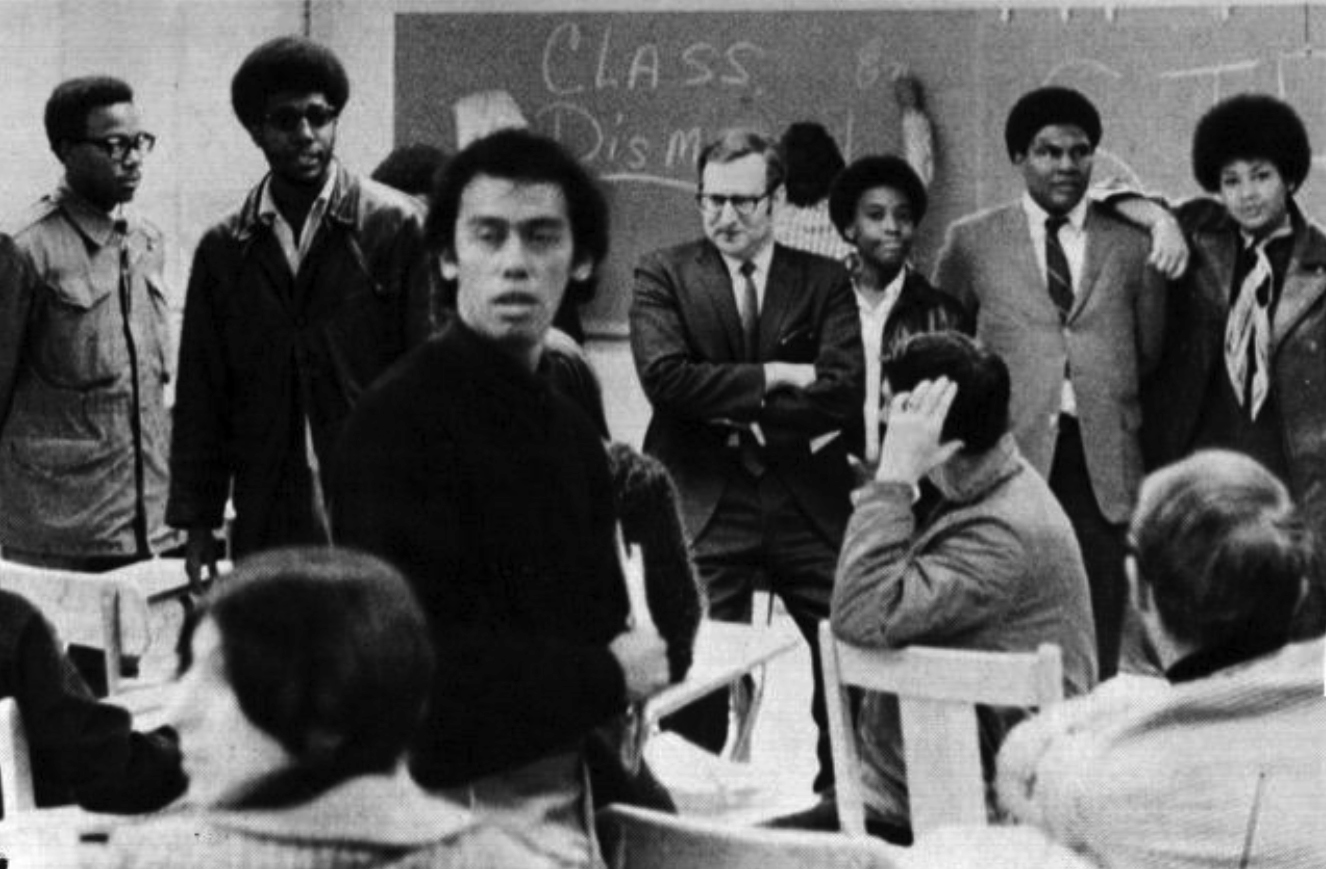
First Day of Strike.
Top right, Nathan Hare in the middle and little Sharon Jones (now AFRS Lecturer) to the left of him.
Announcements
